On April 4, 2024, at the Institute for Economics and Forecasting of the National Academy of Sciences of Ukraine, on the initiative of scientists from the Department of Sectoral Forecasts and Market Conjuncture of this Institute, a round table on "Problems of the Markets of Goods and Services in Ukraine under Martial Law" was held, which was attended by both Ukrainian and foreign scientists. The topics of the discussions covered the problems of the markets of goods and services in Ukraine, changes that have taken place in the domestic and world markets after the start of large-scale Russian armed aggression against Ukraine, and promising directions for further market development.
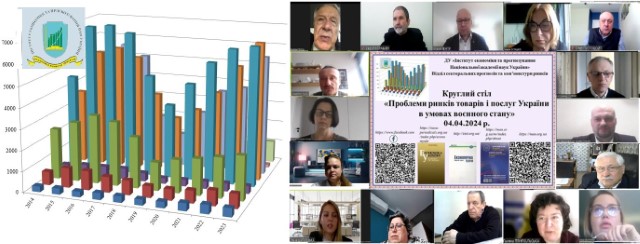 |
The Director of the Institute for Economics and Forecasting of NAS of Ukraine, Academician Valeriy Heyets, welcomed the participants and noted that under the current conditions of emergency situations, the restoration of markets is extremely urgent, because a political factor has been added to the problems of competition, monopoly and regulation. Blocking markets and restricting access to them in the current situation of political and military confrontation significantly complicates the already difficult traditional tasks that must be solved in order for the market to work perfectly and efficiently. Academician Valeriy Heyets noted that the researchers’ work to achieve this goal is extremely important, and invited the participants of the round table to cooperate with the Institute for Economics and Forecasting of NAS of Ukraine - a scientific institution actively involved in the integration of the Ukrainian economy into the European commonwealth.
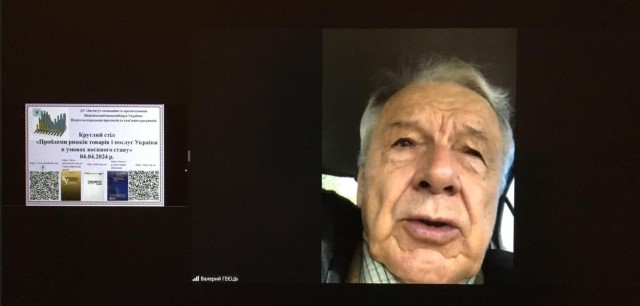 Welcome speech by Valeriy Heyets, Academician of NAS of Ukraine |
As the Deputy Director for Scientific Work of the Institute for Economics and Forecasting of the NAS of Ukraine, Correspondent Member of the NAS of Ukraine Serhii Korablin emphasized, after the global financial crisis of 2008-2009, the postulates of the neoliberal doctrine almost disappeared from the scientific and practical context. So it is quite symptomatic that on the web pages of leading financial organizations it is difficult to find even mentions of the "Washington Consensus", which had envisaged the replacement of state regulation with instruments of market self-adjustment. There are no more calls for massive global deregulation of markets. And after February 2022, these trends acquired additional, completely new features. For example, while during the presidential term of Donald Trump in 2017–2021 the ideas of returning foreign investments and national business to their countries of origin (reshoring) were popular, then today in the leading Western economies there is talk about the deliberate separation of certain areas of activities from unfriendly countries for reasons of national security (decoupling), reducing economic dependence on such countries by diversifying one's own external relations (de-risking) and moving production to friendly countries (friendshoring). The scientist also noted that, in view of global trends, entering new markets will not be easy and smooth, because the blocking of the border by Poland already demonstrates that Ukraine has obvious competitive advantages - and not only in the agricultural complex, but and in logistics mechanisms and tools. All this requires special attention to vertical and specific regulation within individual sectors and markets. At the same time, Serhii Korablin emphasized that attention should be given not only to Ukraine's opportunities and potential, but also to objective limitations.
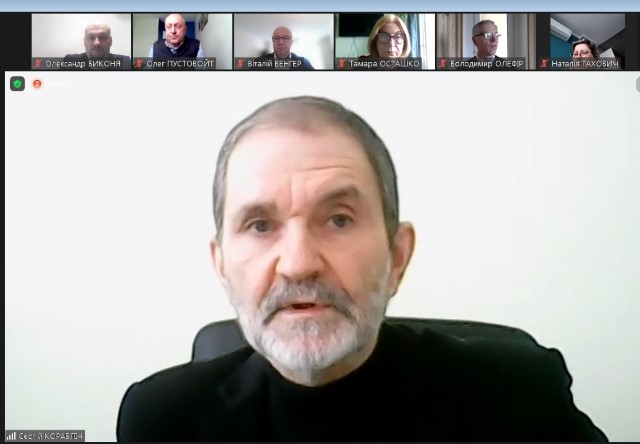 Corresponding Member of the NAS of Ukraine Serhii Korablin |
The Head of the Department of Sectoral Forecasts and Market Conjuncture of the Institute for Economics and Forecasting of NAS of Ukraine Doctor of Economics Vitalii Venger noted the extreme importance and relevance of the round table’s topic and invited the participants to an active discussion.
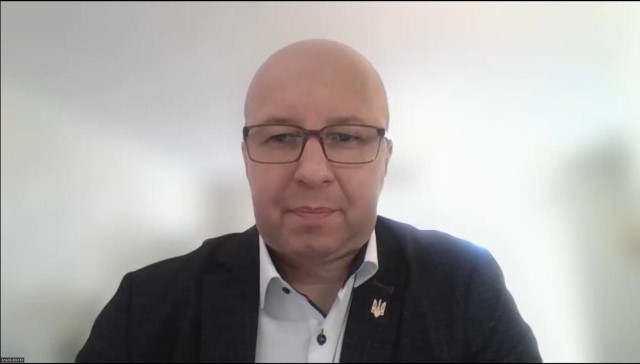 Welcome speech by Doctor of Economics Vitalii Venger |
It is worth noting that under the martial law, Academy scientists pay special attention to the problems of the Ukrainian grain market. As noted by Tamara Ostashko, Chief Researcher at the Department of Sectoral Forecasts and Market Conjuncture of the Institute for Economics and Forecasting of NAS of Ukraine, Corresponding Member of the National Academy of Agrarian Sciences of Ukraine, in 2023–2024, the problems that come to the fore are those related to bans on import (and even on transit) of Ukrainian grain introduced by Poland and other European Union countries bordering Ukraine. Negotiations are currently ongoing in the EU regarding the limitation of the regime of full liberalization of Ukrainian imports, which has been in force since 2022. This will slow down the development of Ukrainian exports of poultry meat, corn, honey and other goods, and the state budget of Ukraine will lose more than 331 million euros from July 2024 to July 2025.
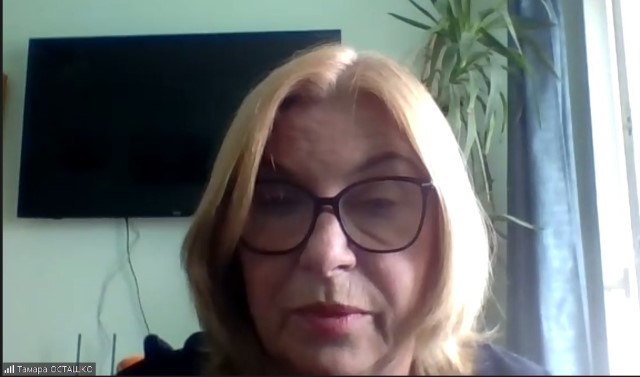 Corresponding Member of the National Academy of Agrarian Sciences of Ukraine Tamara Ostashko |
Head of the Department of Sectoral Forecasts and Market Conjuncture, Dr. of Economics Vitaliy Venger in his presentation, drew attention to the emergence of a qualitatively new structure of metallurgical production and noted that overcoming the challenges faced by Ukraine’s metallurgical industry requires a comprehensive approach from both the state and the companies themselves.
 Doctor of Economics Vitalii Venger making his presentation |
Leading Researcher of the Department of Sectoral Forecasts and Market Conjuncture Dr. of Economics Oleh Pustovoyt noted in his presentation that one condition for rapid economic recovery is the development of export markets for products with increased technological complexity.
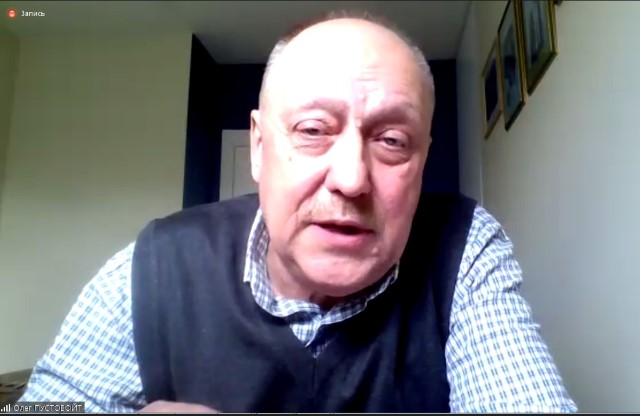 Oleh Pustovoit, Doctor of Economics |
Senior Researcher of the Industrial Policy Department Dr. of Economics Olena Tsyplitska focused attention on the evaluation of the global market of titanium products for medical use and outlined the prospects of its production in Ukraine.
 During the presentation by Doctor of Economics Olena Tsyplitska |
The state and trends of Ukraine’s cable market described Research Officer of the Industrial Policy Department PhD in Economics Lilia Wenger.
The presentation by Head of the Institute’s Infrastructure Development Department Dr. of Economics Olena Nykyforuk was devoted to the existing problems in the market of transport services in Ukraine.
The relevance of the insurance of military risks and financing of European defense production was discussed in the presentation by lecturer of the Institute of Banking of the Warsaw School of Economics (Poland) PhD in Economics Lada Woloschenko-Holda.
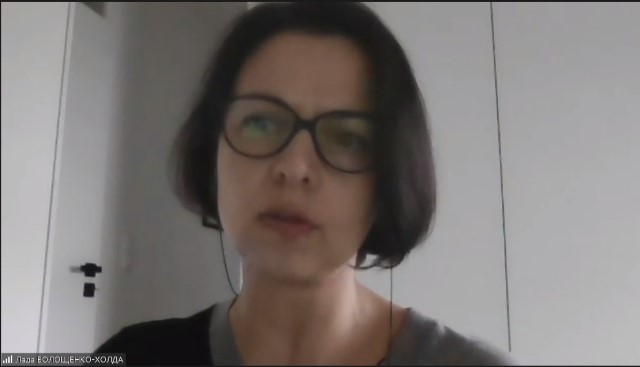 PhD in Economics Lada Voloshchenko-Holda |
The impact of martial law on population incomes, changes in consumer habits and savings opportunities was analyzed by Head of the Department of Finance of the Borys Hrinchenko Kyiv Capital University Doctor of Economics Andrii Ramsky.
In continuation of the discussion, Leading Researcher of the Department of Sectoral Forecasts and Market Conjuncture PhD in Economics Volodymyr Olefir identified the problems of the consumer goods market under modern conditions.
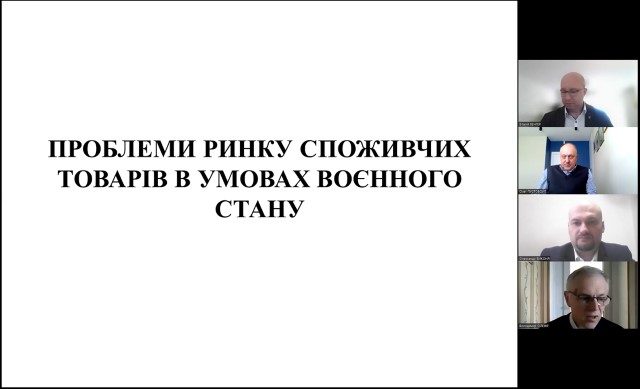 PhD in Economics Volodymyr Olefir speaking |
Noting the impact of digitalization on the development of international trade, Senior Researcher of the Industrial Policy Department Doctor of Economics Oksana Kushnirenko pointed out the need to simplify the adaptation of Ukrainian producers to the challenges of digital trade, which requires joint efforts by the government, companies, civil society and international organizations to form a system to support the foreign economic activities of Ukrainian producers, and harmonization of the legislation to approximate Ukrainian trade practices to European rules and procedures.
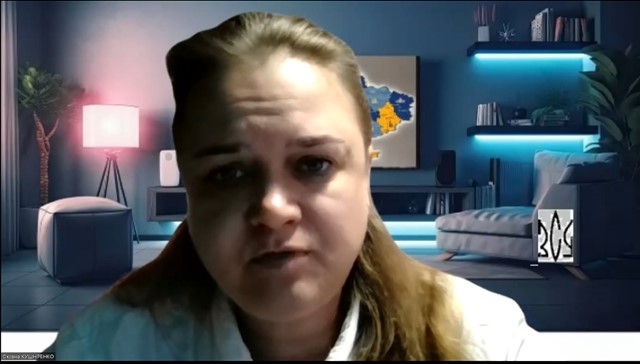 Presentation by Doctor of Economics, Associate Professor Oksana Kushnirenko |
The modern challenges of the development of innovation market under the conditions of martial law were outlined in her presentation by Leading Researcher of the Department of Innovation Policy, Economics and Organization of High Technologies PhD in Economics Olena Boyko.
Senior Researcher of the Department of Sectoral Forecasts and Market Conjuncture PhD in Economics Oleksandr Bykonya focused on the problems of Ukraine’s national IT services sector and noted that its further development requires the development and substantiation of measures and practical recommendations regarding the preservation of personnel potential, attracting investments, and establishment of scientific and technological cooperation with leading companies.
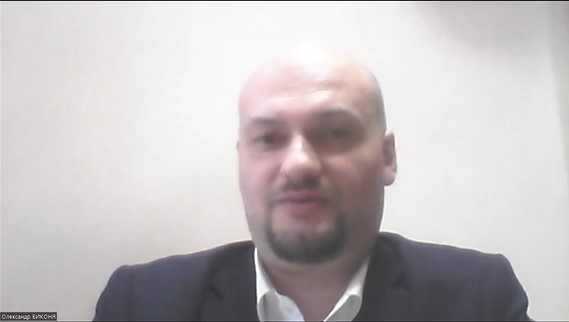 PhD in Economics Oleksandr Bykonia speaking |
The digitalization of the aviation industry services market, which is currently at a complete standstill as a result of the full-scale Russian invasion, was discussed in the presentation by Research Officer of the Department of Sectoral Forecasts and Market Conjuncture PhD in Economics, Associate Professor Natalia Romanovska.
Head of the Department of Sustainable Development and Product Ecology, Doctor of Economics, Professor, the engineer of University of Chemistry and Technology in Prague (Czech Republic) Vladimir Kochi focused on the problem of the carbon footprint - as a new sustainability indicator, which under modern conditions should be taken into account by business in its activities, and will be reflected in the export of products.
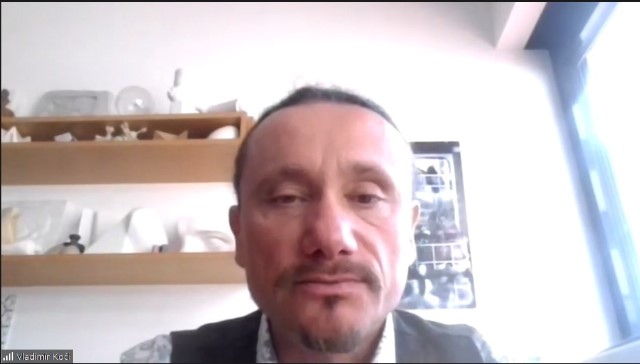 Professor, Doctor of Sciences Vladimir Kochi |
Leading Researcher of the Department of Sectoral Forecasts and Market Conjuncture PhD in Economics Halyna Trypolska identified the directions of influence and methods of adaptation of renewable energy markets in Ukraine under the conditions of war.
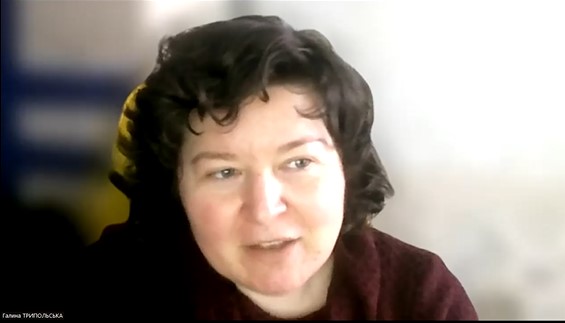 During the presentation by Halyna Trypolska, PhD in Economics |
A graduate student from the Institute for Economics and Forecasting of NAS of Ukraine Olha Yevstigneyeva presented her own vision of what the state's climate policy should be in order to preserve the European sales market for Ukrainian businesses.
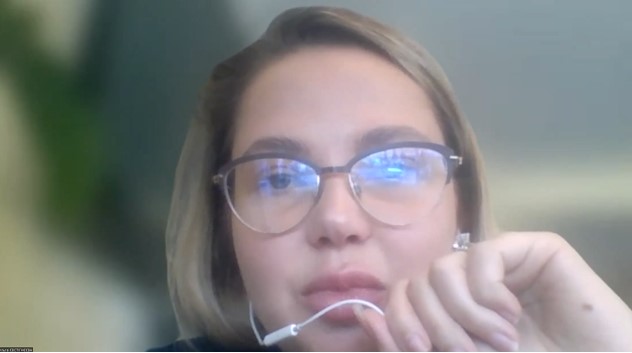 Graduate Student Olha Yevstigneeva speaking |
According to the results of the meeting, it is planned to publish a number of articles in the scientific journals published by the Institute for Economics and Forecasting of NAS of Ukraine, and to exchange opinions on the development of ideas and research in the specified direction at further scientific events.
According to the Institute for Economics and Forecasting of NAS of Ukraine